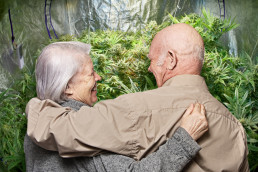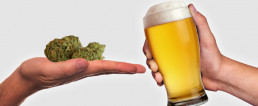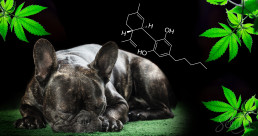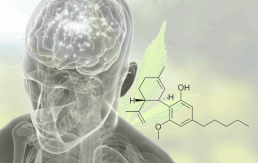Scottish Mother wins fight with cancer with help of medical cannabis
Scottish Mother wins fight with cancer with help of medical cannabis
- Glaswegian mother, Sharon Fitzsimons, claims to have beat her cancer with a combination of chemotherapy and medical cannabis
- Sharon was able to replace all medications with a 1:1 THC:CBD
- Cannabis activist group, Tottenham Compassion Club, helped save Sharon from the mercy of criminal street gangs
- The courageous cancer survivor now wants to help save other terminal cancer patients with medical cannabis provided by a UK Compassion Club.
Sharon Fitzsimons, 50, from Glasgow, announced she had won her battle with cancer on Monday, claiming her use of a tincture containing THC and CBD, helped her deal with the pain her chemotherapy was causing.
Sharon was diagnosed with ovarian cancer last year after going for a routine check-up:
“I went for a routine hysterectomy on the 18th July of last year, because of my family history of cancer. I decided to go for surgery, it all went well.
“Two weeks after my first surgery I was told they found cancer in both fallopian tubes and also on the outside of my ovaries, which makes cancer spread.
“There was a second surgery to remove Omentum fatty layer which covers the organs. They found cancer in there as well and also in 7 lymph nodes.
“I was diagnosed with stage 3b and aggressive cancer.”
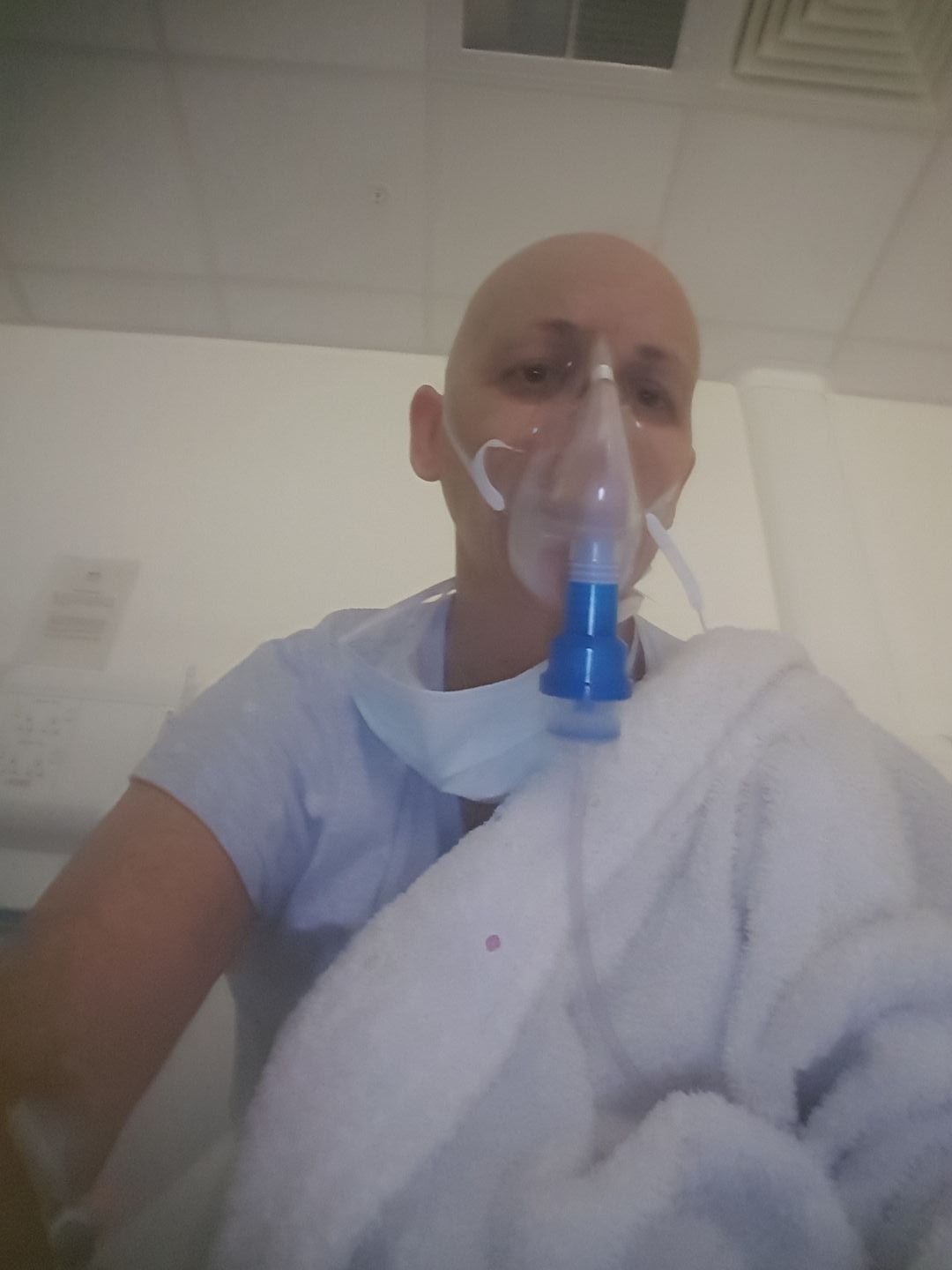
Sharon explained how she used the cannabis tincture to replace the pharmaceutical medications she was prescribed to help her deal with the pain the chemo was causing:
“I did initially take the prescribed medications, but managed to wean myself off them. I never took the morphine, or any of the other opiates.
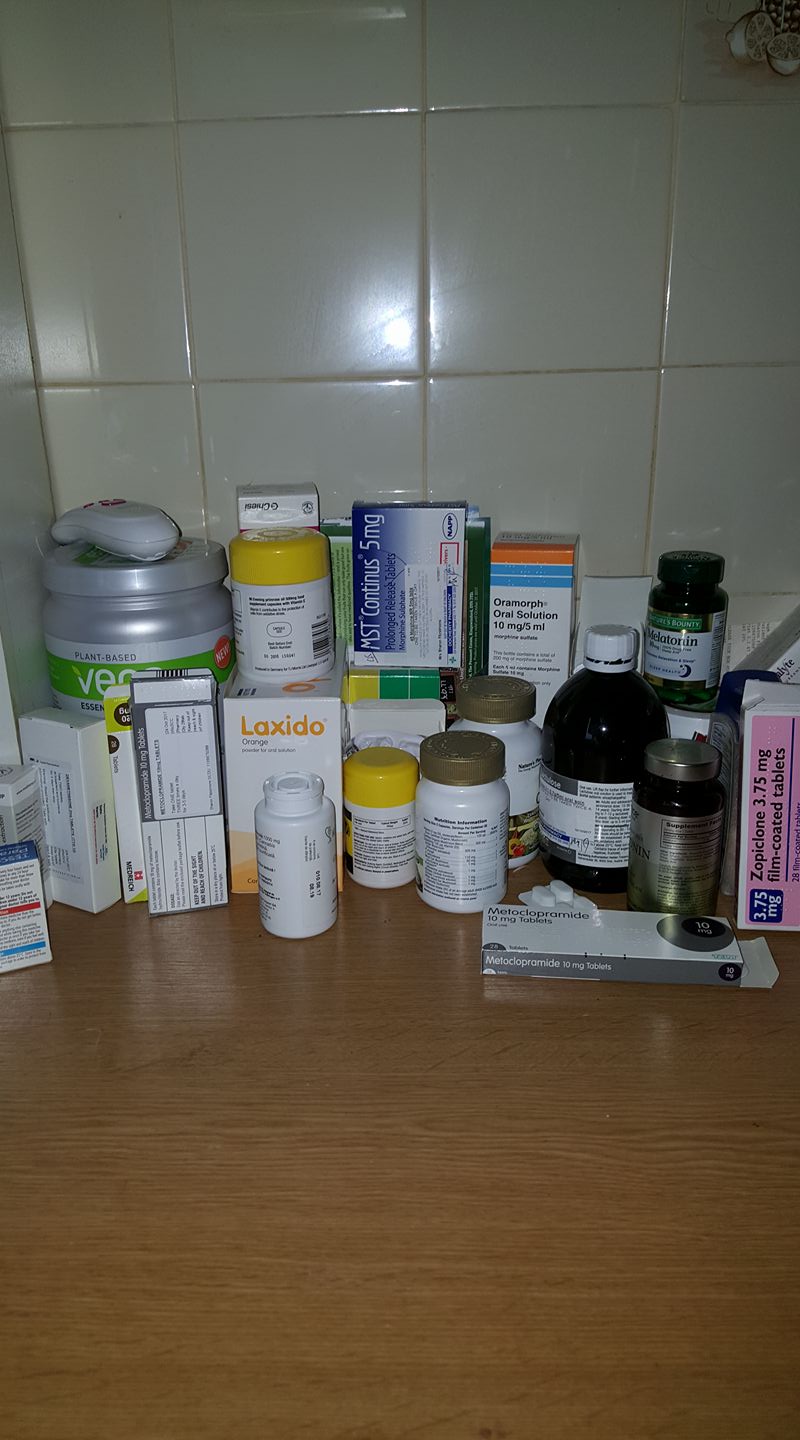
“I just took my 1:1 tincture and it took the pain away! It helped me sleep, helped me eat.
“I noticed an instant difference, both night and day.”
Medical cannabis has not only helped Sharon win her battle with cancer, it is also helping her deal with the pain that chemotherapy has left her in:
“Just because I am cancer free, I have been through chemo which has left me in pain 24/7 a day… if I didn’t have my 1:1 tincture I wouldn’t be functional right now.”
“By the time they make it legal, I will have lost many friends who are truly beautiful people. People, who are in the worst pain imaginable! Shame on the establishment! They have blood on their hands!“
– Sharon Fitzsimons, Cancer Survivor & Medical Cannabis Warrior
Despite the help cannabis provided Sharon, the ancient herbal medication is still demonized in British society due to the decades of Prohibition and propaganda rhetoric, such as the current “Skunk” madness circling British media stories.
The current climate of fear about cannabis is putting patients, who could significantly benefit, off from trying cannabinoid medications:
“I deal with this issue all the time with terminal patients who are afraid to take it, even after I explain all the potential benefits.
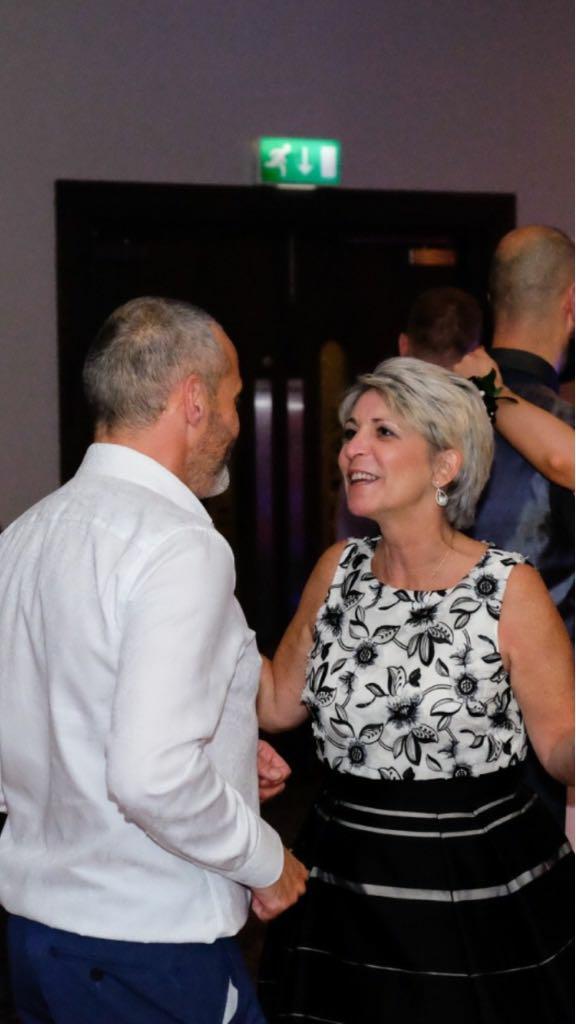
“The stigma is so bad they probably think I’m mad!
“I can only lead them to the water, I can’t make them drink. It’s so sad to me, as a warrior for legalise medical cannabinoids.”
“I’m made to feel like a criminal, but I would go to jail in a second rather than die!
“I try very hard to get my terminal friends to take it, but the stigma cannabis gets makes me sick.
“By the time they make it legal, I will have lost many friends who are truly beautiful people. People, who are in the worst pain imaginable!
“Shame on the establishment! They have blood on their hands!
“Medical cannabis is an amazing, natural, medicine. No one will stop me from what I am doing. Ever!”
Not fazed by the law surrounding cannabis, or the stigma, Sharon informed her medical team exactly what she was using, finding surprising support:
“I told every doctor I have had what I use; ‘they say good!’ They were so positive about it.
“When I was given the all-clear on Monday, they were nonchalant about it. I know their hands are tied though.”
Cannabis clearly has the potential to help so many people who are in life-threatening medical conditions or constant pain. Without it, brave women like Sharon may not be alive.
Due to prohibition, patients are at the mercy of the black market, often being over charged or scammed by criminal gangs.
The cannabis picked up from street dealers may not be the right strain, with the right cannabinoid ratio, for a patient, and is often over-priced, leaving patients in financial ruin, just for trying to access a medication.
“I took street cannabis,” Sharon explained, “but I didn’t like the high it gave me.”
Thankfully organizations and clubs are being set up all over the UK to defy the government and bring medical cannabis to those who need it most.
“I just wanted something for the pain. I am not, nor was ever, a smoker.
Unlike many medical cannabis users in the UK, however, Sharon was able to find a Compassion Club, The Tottenham Compassion Club (TTCC), after speaking to Callie Blackwell, who brought medical cannabis into headlines last year after going on national TV to announce it had helped save her son’s life.
“As soon as I had cancer I started looking into Medical Cannabis.
“I contacted Callie after seeing her on loose women and she gave me the details for someone from Tottenham Compassion Club (TTCC).
“I had messages from many different sources, including a lab in Barcelona, offering me help.
“I decided to go with TTCC after a long conversation with one of their members. He advised me to begin a 1:1 tincture in August, last year.
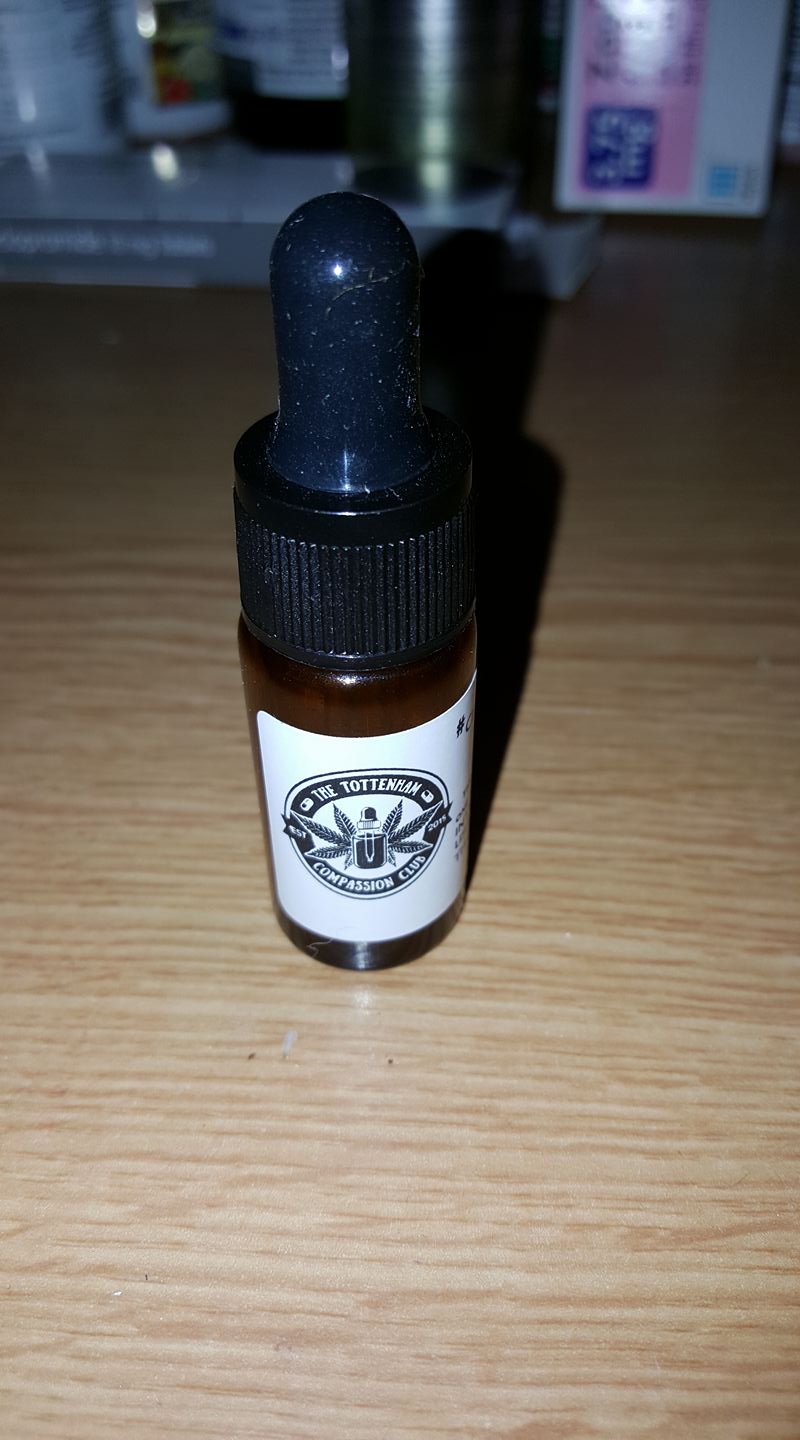
“He also gave me cannabis flowers, high in CBD, and that was it!
“He is a life saver! My pain just went away, it was truly amazing!
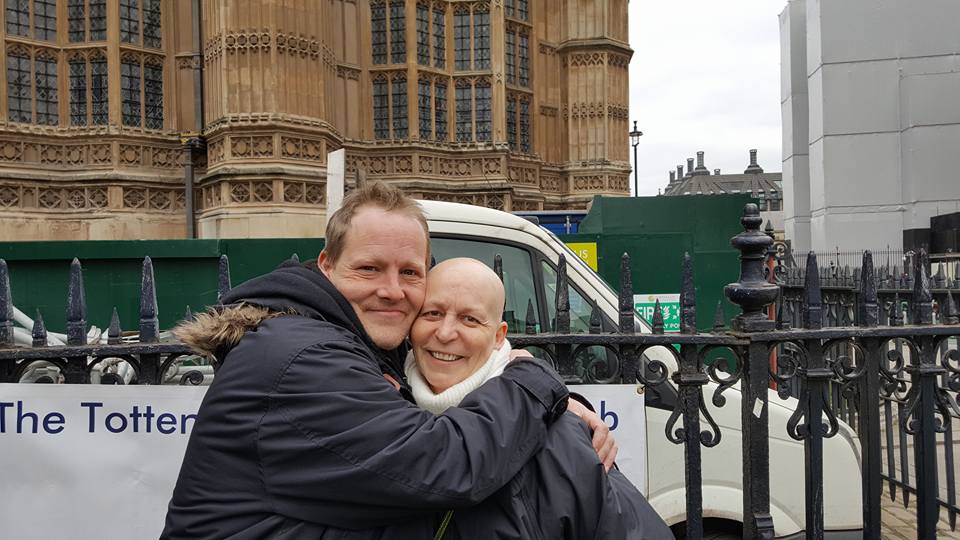
“There was no high like the street stuff, and I knew exactly what I’m getting when I use the tincture and flowers from TTCC.”
“Having him has provided peace of mind. I no longer need to worry about going to the streets anymore.” While Sharon did use chemotherapy to initially treat her cancer, the brave mother’s story clearly indicates that medical cannabis helped her survive the battle, and will continue to help her deal with the constant pain she is in post-chemo.
British laws, which classify cannabis as having “no medicinal value,” are endangering the most vulnerable members of our society. Not only are patients being warned against the “dangers” of cannabis, which is putting many off the non-fatal drug, but it is also forcing them to fund criminal gangs by buying cannabis from the streets.
While many Governments across the world, most recently Greece, are legalising cannabis for medicinal purposes, our Conservative Government is refusing to allow patients the same right in the UK.
In response to a public outcry for Alife Dingle, a young boy fighting intractable epilepsy, to be given a special prescription, the Government released a statement clearly ruling out legalisation:
“Cannabis is listed as a Schedule 1 drug, as in its raw form it is not recognised in the UK as having any medicinal benefit and is therefore subject to strict control restrictions.
“This means it cannot be practically prescribed, administered, or supplied to the public in the UK, and can only be used for research under a Home Office licence.
“The Home Office would not issue a licence to enable the personal consumption of a Schedule 1 drug.”
This is not right. It is a cruel, heartless response to a situation which needs addressing with compassion. The same compassion TTCC showed to Sharon, which she is now passing onto other terminal cancer patients.
Without more medical cannabis patients standing up to share their story, the public will never know how ridiculous and vicious our current drug laws are.
UK Largest Producer of Medical Cannabis in World yet Still Denies Access to Citizens
UK Largest Producer of Medical Cannabis in World yet Still Denies Access to Citizens
- A new UN report revealed that the UK is world’s largest producer of medical cannabis
- More than 95 tonnes of legal cannabis was grown in the UK in 2016
- GW Pharmaceuticals, owned by British Sugar, is the main manufacturer
- Medical cannabis remains illegal in the UK
A new report from the UN’s International Narcotics Control Board has exposed the cruel hypocrisy underlying Britain’s drug policies.
The UN revealed that the UK is the largest producer and exporter of legal medical cannabis in the world, while simultaneously denying its citizens the right to access medical cannabis.
The report which used data from governments all over the world, found that the UK produced 95 tonnes of cannabis in 2016, more than double the 2015 total of 42 tonnes.
The majority of this “legal” cannabis is produced by one company: GW Pharmaceuticals. GW made headlines in 2010 after releasing Sativex: a controversial, cannabinoid-based, medication, legal to purchase in the UK.
Sativex is “an oromucosal spray of a formulated extract of the cannabis sativa plant that contains the principal cannabinoids delta-9-tetrahydrocannabinol (THC) and cannabidiol (CBD) in a 1:1 ratio.”
GW is legally growing cannabis containing THC despite the British Government viewing cannabis as having “no medicinal properties,” refusing to remove it from Schedule I, the strictest level of drug schedule.
The blatant hypocrisy of the British Government is an insult to the millions of medical cannabis users in the UK who are routinely criminalised and punished for accessing the same medication the British Government allows a large Multinational Company to legally export all across the world
“It is profoundly unethical, and a violation of the fundamental right to health, to deny people access to medicines that are prescribed by their doctors.“
– Steve Rolles, Transform’s Senior Policy Analyst
The Tory Government denies that cannabis has medical uses, with Theresa May, the British Prime Minister, claiming that cannabis leads users onto harder drugs, such as heroin, ignoring the research which proves that cannabis is an “exit drug,” helping many addicts to come off harder drugs.
While the Tory Government denies that cannabis has any medicinal value, at all, one of their own MPs, personally profits from the fact the UK is the largest producer of medical cannabis in the world.
Atkins has rallied against legalising cannabis for medicinal purposes on multiple occasions.
Atkins, the Minister for Drugs, is married Paul Kenward, the managing director of British Sugar.
British Sugar owns GW Pharmaceuticals.
A sceptic may be of the belief that she is working to ensure her husband’s company remains the only one with a medical cannabis license in the UK…Discussing the UN’s findings, Steve Rolles, Transform’s Senior Policy Analyst said:
“It is scandalous and untenable for the UK government to maintain that cannabis has no medical uses, at the same time as licensing the world’s biggest government approved medical cannabis production and export market.
“UK patients are either denied access and suffering unnecessarily, or are forced to buy cannabis from the criminal market. Countries with proper access to medical cannabis do not have this problem, as standardised cannabis products are in the hands of doctors and pharmacists.
“It is profoundly unethical, and a violation of the fundamental right to health, to deny people access to medicines that are prescribed by their doctors.
“The government must relax restrictions that grant a monopoly for a single product to a single company.
“It must allow access to cannabis-based medicines that serve patients needs – what they don’t need is the government’s cruel and misguided war on people who use drugs.“
If the Government truly believed that cannabis has “no medical properties,” they would not allow their country to be used to grow the most amount of legal cannabis in the world.
Money talks.
Medical Cannabis Cultivation Bill Passes Greek Parliament
Medical Cannabis Cultivation Bill Passes Greek Parliament
- Greek politicians voted in favor of Greece’s newest Medical Cannabis Bill
- The Bill will legalise the cultivation and manufacturing of medical cannabis in Greece
- The Bill faced opposition from left-leaning Parties, such as New Democracy and the Communist Party
Greece’s Parliament voted last Thursday to approve the cultivation and manufacturing of cannabis for medicinal purposes.
The Government Coalition Government, SYRIZA, and the Independent Greeks (ANEL), the Democratic Coalition and Potami voted in favour.
The bill, perhaps surprisingly, faced opposition from New Democracy, the Communist Party, Golden Dawn and the Centrists Union. Discussing the bill, Andreas Xanthos, Greece’s Health Minister, said: “We are discussing the licensing of a single, integrated unit that includes production, processing and production of finished medicinal products of hemp.
“That’s what it is about.”
Despite the bill being ‘neither complete clearly defined,’ Opposition Parties voted in favour due to viewing it as a ‘first step in the right direction.’
New Democracy, who voted against the Bill, claimed to have not done so in opposition to medical cannabis, but rather against the manner in which the Government presented the bill.
Their fear is that there were not enough safeguards in the bill to prevent uncontrolled cultivation, production and sale of medical cannabis, leading to black market leakage.
The Communist Party went as far as calling on the Government to withdraw the bill, accusing ministers of opening up the sector to “vultures” and “murderous multinationals.”
“We are discussing the licensing of a single, integrated unit that includes production, processing and production of finished medicinal products of hemp.“
– Health Minister, Andreas Xanthos
While Greek patients are one step closer to accessing legal cannabinoid medications, British patients are still being punished by their Government for having the audacity to want access to the medication of their choice.
The Elizabeth Brice Bill, which would have rescheduled cannabis from Schedule I to II in the UK, was filibustered by Labour MPs, Sandy Martin MP and Cat Smith MP, meaning it will be postponed until June.
Some cannabis activists share the same concern of the Greek Communists: that legalisation will only come in the form of prescription, pharmaceutical medications. The only thing which is currently certain is that cannabis remains illegal in the UK for medicinal purposes, and the Government views it as having “no medicinal properties.”
As children like the brave young Alfie Dingley have shown, however, cannabis truly does show enormous medical potential. The only way to tap into that potential is by legalising.
New research finds medical cannabis “significantly safer” for elderly patients than opioid medication
New research finds medical cannabis “significantly safer” for elderly patients than opioid medication
- Israeli researchers have found strong evidence that medical cannabis is “significantly safer” for elderly patients than pharmaceutical medication
- 94% of respondents reported improvement in their condition and reduced pain levels
- Nearly 20% of participants reduced or completely stopped their use of opioid medication
A new study has found medical cannabis to be significantly safer for elderly patients than pharmaceutical medications.
The study, published in The European Journal of Internal Medicine, found that medical marijuana is “safe and efficacious for elderly patients” seeking to treat symptom related to chronic pain, cancer symptoms, Parkinson’s disease, Chron’s, MS, PTSD among a plethora of medical issues.[/fusion_text][fusion_text]Researchers from the Ben-Gurion University of the Negev (BGU) and the Cannabis Clinical Research Institute at Soroka University Medical Center conducted a surveyed 2,736 medical cannabis patients aged 65 years and older who received medical cannabis through “Tikun Olam,” the largest Israeli medical cannabis supplier.
Due to the recent substantial growth in the use of medical cannabis by elderly patients, researchers aimed to “assess the characteristics of elderly people using medical cannabis and to evaluate the safety and efficacy of the treatment.”
During the 6-month study period, 2736 patients above 65 years of age began cannabis treatment and answered the initial questionnaire.
Chronic pain (66.6%) and cancer (60.8%) were the most common reasons given by respondents for using medical cannabis.
“After monitoring patients 65 and older for six months, we found medical cannabis treatment significantly relieves pain and improves quality of life for seniors with minimal side effects reported.”
– Professor Victor Novack
Following six months of cannabinoid treatment, 93.7% reported an “improvement in their condition and the reported pain level was reduced from a median of 8 on a scale of 0-10 to a median of 4.”
The study also found that “18.1% [of respondents] stopped using opioid analgesics or reduced their dose,” after the 6-month period.
While pharmaceutical medications come with multiple severe adverse side-effects, the most common “adverse effects” reported by respondents were: “dizziness (9.7%) and dry mouth (7.1%).”
More than 33% of patients used cannabis-infused oil; 24% smoked cannabis flowers, with 6% preferring vaporization.
Discussing the results of the study, Professor Victor Novack said: “After monitoring patients 65 and older for six months, we found medical cannabis treatment significantly relieves pain and improves quality of life for seniors with minimal side effects reported.”
Professor Novack is a professor of medicine in the BGU Faculty of Health Sciences (FOHS), and head of the Soroka Cannabis Clinical Research Institute. While the results from the study are promising, the researchers acknowledged that more research will be needed before full conclusions can be made:
“Gathering more evidence-based data, including data from double-blind randomized-controlled trials, in this special population is imperative.”
References and further Reading
https://www.ncbi.nlm.nih.gov/pubmed/29398248
Research proves alcohol more damaging to brain than cannabis
Research proves alcohol more damaging to brain than cannabis
- Research from University of Colorado finds alcohol does more damage to brain than cannabis
- Cannabis does not impact grey and white matter in the brain, even after years of use, unlike alcohol
- Alcohol significantly lowers volumes of brain tissue
- In 2015, there were 8,758 alcohol-related deaths in the UK
- There has yet to be a fatality related to cannabis-use
Researchers from the University of Colorado Boulder have found significant evidence that alcohol is severely more dangerous to the human brain than cannabis.
The team from the Department of Psychology and Neuroscience discovered alcohol consumption is linked to lowered volumes of brain tissue, particularly white and grey matter. White matter controls communication while grey matter enables general brain function.
Researchers studied adults aged 18–55 years and adolescents aged 14–18 years with a range of alcohol and cannabis use to find out which substance was more damaging to the body’s most vital organ: the brain.
MRI scans were taken of the participants’’ brains following a 30-day period of use of varying quantities of either alcohol or cannabis.
Long-term changes to white and grey matter were found in alcohol users, especially those who had been drinking for a longer period.

While researchers found a deterioration of white and grey matter in alcohol users, no significant changes were found in those who only used cannabis
“…while marijuana may also have some negative consequences, it definitely is nowhere near the negative consequences of alcohol.”
– Professor Kent E. Hutchison
Discussing the results of the study, lead researcher Professor Kent Hutchison wrote: “…while marijuana may also have some negative consequences, it definitely is nowhere near the negative consequences of alcohol.”
The team conceded, however, that more research on cannabis’ effect on brain function is needed before any solid conclusions can be made.
Discussing the variety of evidence found across the plethora of studies in cannabis’ impact on the brain, lead author Professor Hutchison to acknowledge that the more research done on cannabis, the clearer the conclusions will be:
“The point is that there’s no consistency across all of these studies in terms of the actual brain structures.”
While there is great debate among the scientific community on the potential benefits or harms of cannabis, there is no debate to be had over which narcotic is more dangerous to humans and our society. Alcohol killed 8,758 people in the UK in 2015, according to Drink Aware.

No one has ever overdosed on cannabis, in the history of our existence.
Is it time to legalise access to cannabis, a far safer (by scientific fact) product than alcohol, in the UK?
MMJ will be supporting the United Patients Alliance who have organized a second Patients at Parliament protest on the 23rd February, when a bill which will reschedule cannabis from Schedule I to II will go through its second reading.
We invite all our readers to join us and help make our voices heard.
References and further Reading
http://onlinelibrary.wiley.com/wol1/doi/10.1111/add.13923/abstract
World Anti Doping Agency removes CBD from Prohibited Substance list
World Anti Doping Agency removes CBD from Prohibited Substance list
- Cannabidiol (CBD) has officially been removed from the World Anti-Doping prohibited list
- New regulations will go into effect just before the 2018 Winter Games in South Korea
- Athletes are still banned from using THC during events
The World Anti-Doping Agency (WADA) has officially removed Cannabidiol (CBD) from its list of prohibited substances.
CBD has become increasingly popular among athletes due to its anti-inflammatory and muscle relaxing properties.
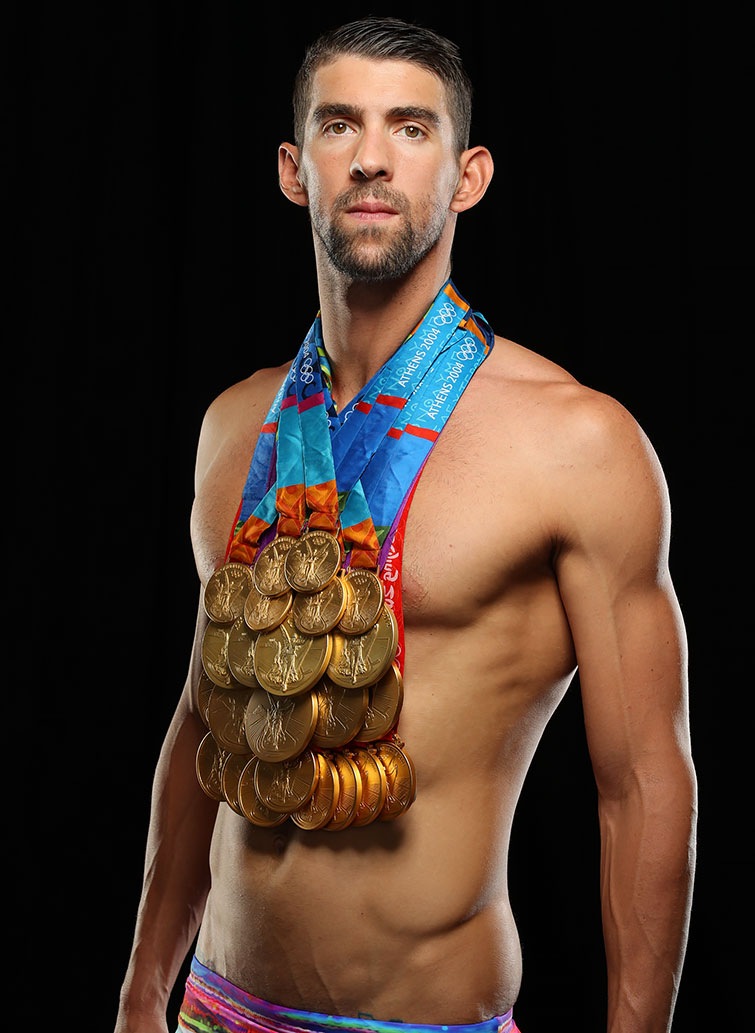
Athletes, such as Michael Phelps and Nate Diaz, who infamously brought CBD vaping into popular culture when he vaped during a post-fight interview, can now use the medicinal cannabinoid without fear of being banned. The removal of CBD from the banned list represents a progressive step forward for The WADA. The organisation made the decision to remove CBD from the banned substance list “based on current scientific and medical knowledge.”
The move to loosen regulations on cannabis began in 2013, when WADA raised the acceptable THC/blood level from 1.50ng/ml to 150ng/ml, allowing athletes to consume cannabis before and after, but not during, Olympic events.
Cannabis was placed on the Prohibited List by the WADA when they created it in 2004.
Cannabinoids were places under all three parameters including performance-enhancement, actual or potential health risk and violation of the spirit of sport.
The WADA views cannabis as a “performance enhancer” due to, ironically, its medicinal properties (which the US and UK Government vehemently deny).
The agency simultaneously claims that while it is a “performance enhancer,” cannabis also impair physical activity.
“It helps with the healing process and inflammation… you want to get these for before and after the fights, training. It’ll make your life a better place.”
– Nate Diaz, UFC Fighter
Due to cannabis’ medical properties, such as its ability to relieve muscle pain post-workout and reduce anxiety, the herb was banned.
Now, however, athletes can enjoy the soothing medical effects of CBD without fear they are unfairly gaining an advantage, because every athlete now can (and should) use CBD.
The WADA also claims that cannabis carries a potential health risk, based on studies which examined its effects on the heart and mind.
These studies, however, were produced by the American National Institute on Drug Abuse, an infamously anti-drug and anti-science organization.
According to The WADA, cannabis’ potential to raise heart rates can increase the risk of athletes suffering heart attack, while the infamous “paranoia” could negatively affect an athlete’s performance.
The WADA also claim that the use of cannabis violates the spirit of sport, due to the fact that the substance is illegal in most competing countries, therefore violating the “moral values” that ought to be upheld up by sports organizations.
Now the same organisation has removed the non-psychoactive cannabinoid, paving the way for athletes to compete at an even higher level than previously thought.
The first official event these regulations will affect will be the 2018 Winter Games in South Korea.
Are you as excited as we are to watch more athletes like Nate enjoy their CBD in press conferences?
References and further Reading
British man saved his dog life using CBD oil
British man saved his dog life using CBD oil
- A man from Suffolk has claimed that Cannabidiol (CBD) has saved the life of his epileptic dog
- His dog, Titch, went from having multiple life-threatening seizures a day to just 3 since June 2017
- “CBD has absolutely changed both of our lives, I don’t think he’d be alive today without it”
- Could CBD become a regular medication for British pets?
A British man has told Medical Marijuana UK that a legal cannabis-based food supplement has changed the life of his severely epileptic dog, Titch. Steve Watson, from Suffolk, turned to Cannabidiol (CBD), the non-psychoactive cannabinoid (chemical) found in cannabis and hemp, after Titch’s seizures became so severe that vets wanted to start him on pharmaceutical medications.
Steve told us:
“About 2 years ago my dog Titch started having seizures.
“They started out as little fits or ‘turns,’ gradually getting worse and closer together until his seizures were coming more and more often.
“At that time, somebody tagged me in a Facebook video where a dog was exhibiting signs of a seizure, they administered CBD, and the “fit” seemingly stopped.
“At that same time, I was getting to the point where I’d have had to have taken him to the vets, where he fit the criteria to be medicated daily, which is something I really wanted to avoid, as the medications for epilepsy often get the dog ‘stoned’.”
We have previously reported on numerous human patients who have turned to cannabinoid-medication for epilepsy instead of traditional, and often dangerous, pharmaceutical medications, including the brave young Billy Caldwell from Northern Ireland. “CBD has absolutely changed both of our lives, I don’t think he’d be alive today without it.”
Steve explained why he decided to try CBD rather than pharmaceuticals:
“I had given him diazepam before, and I didn’t like what it did to him, so it was important to me that he never take that first dose of phenobarbital or gabapentin.”
One of the many reasons for the explosion in use of CBD in the UK are the CBD help groups being set up on social media websites, such as Facebook.
These groups help newcomers to the health supplement craze, such as Steve, help understand how the medicinal cannabinoid works, what doses to use, which brands are genuine, etc:
“At that time, I was invited to a CBD group on FaceBook and also received some samples of CBD.
“I had no idea what I was doing, so I just did what I thought was right, and started giving him oil as soon as possible.”
Steve was amazed at just how quickly the hemp-derived medication worked:
“It was only 2 days later that he had his next fit, but instead of having a massive fit followed by a cluster, he had one small seizure, and recovered quicker than he had before.
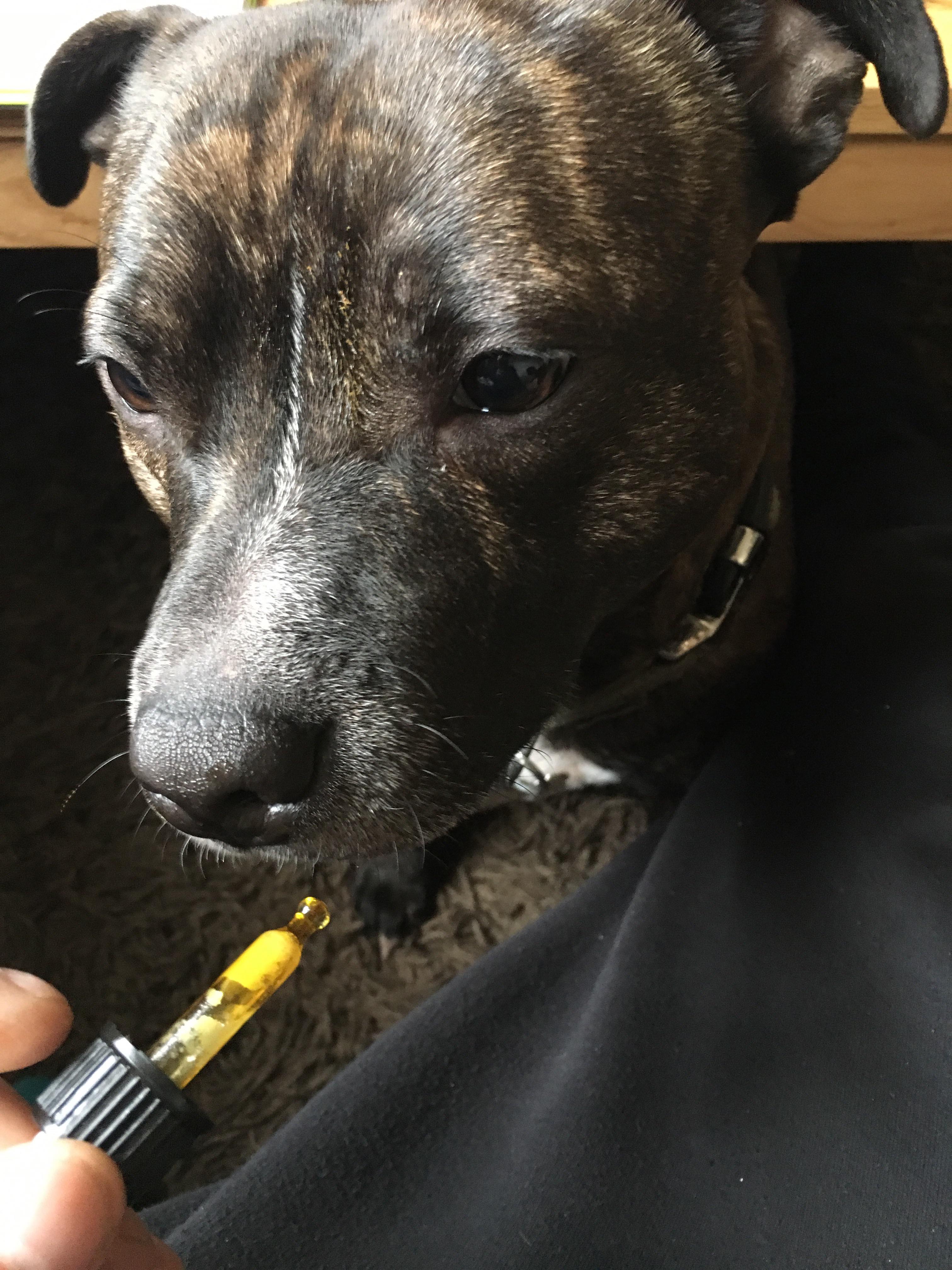
“Then after I’d been giving it to him for a few weeks, his fits stopped completely, and I’m confident that I’m completely controlling his fits with CBD.
It’s also helped with his appetite and water intake, he even sleeps better.” But how does the CBD spray help treat Titch’s seizures?
Epileptic seizures are caused by irregular electrical discharges, or misfiring, among brain cells. This causes convulsions of the body, loss of consciousness, and sometimes severely altered senses.
Cannabidiol has anticonvulsant properties, which help reduce seizures in mammals.
All mammals have an Endocannabinoid System (ECS), including our beloved canine and feline pets. The ECS allows cannabinoids, such as CBD and THC, to interact with our bodies.
The anticonvulsant properties of CBD work by operating on different targets, which are calcium ion channels, glutamate receptor antagonists, sodium ion channels, and the GATA system and receptor agonists, in the brain.
Anticonvulsants may affect the neurotransmitters responsible for sending messages or attach themselves to the neurons. This is done to alter the activity of the cell by switching how ions flow into and out of the neurons.
Cannabinoid medications, however, are not a “cure-all,” meaning they may work better on different patients (both human and animal) as Steve was quick to stress:
“Recently he [Titch] had to go to the vet to have a growth removed, and while he was there, I thought I’d have him castrated.
“I didn’t even take into consideration that the GA would trigger his epilepsy, so after his surgery, he had 2 days of seizures, it took me back to the powerlessness I felt before CBD, so from that I learned that CBD is brilliant, but it’s not a magic fix.
“Now he has the very occasional fit early in the morning, and when he wakes up he doesn’t remember like he used to.
“He doesn’t cry like he used to.
“CBD has absolutely changed both of our lives, I don’t think he’d be alive today without it.
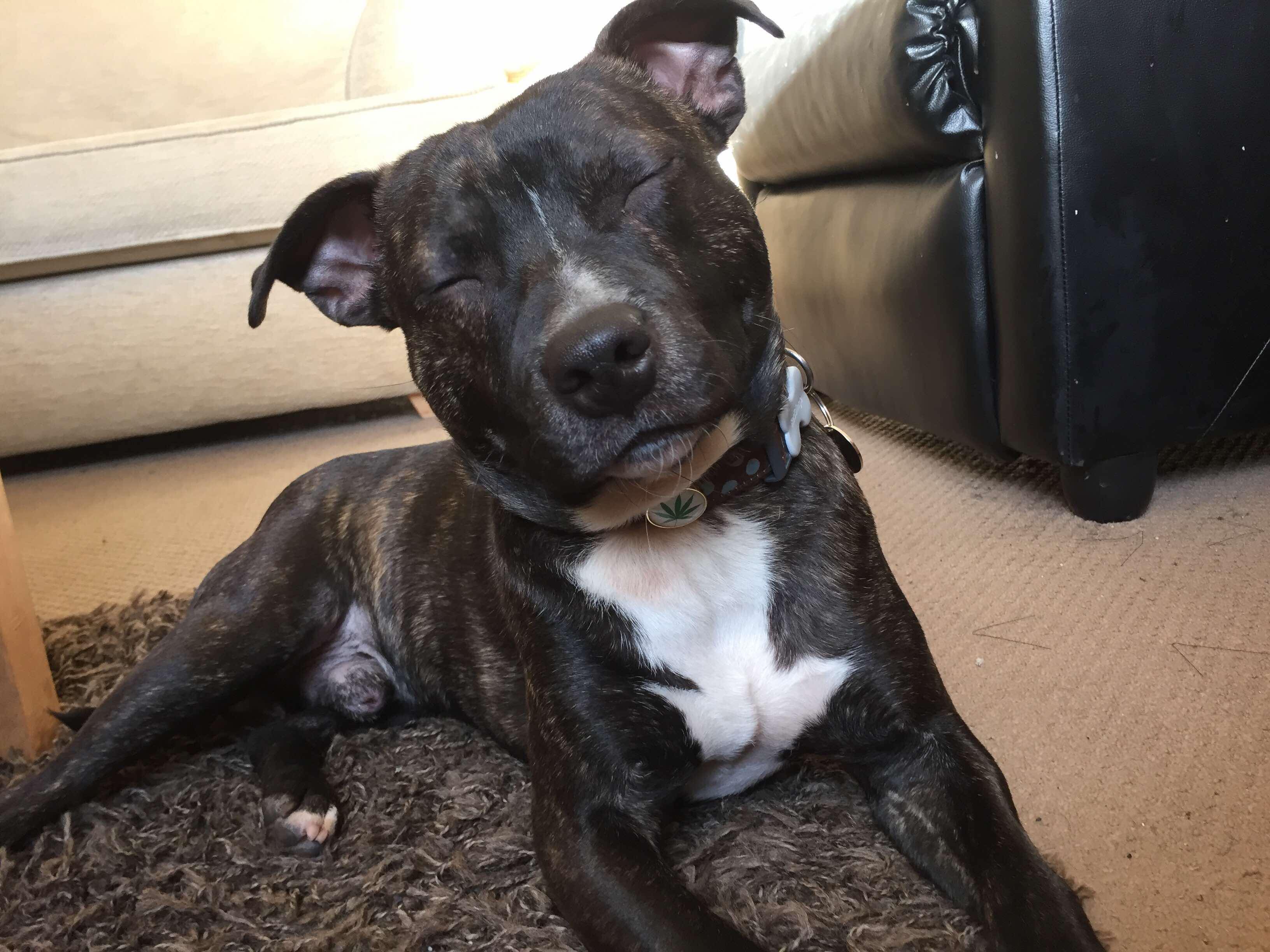
“He’s been on CBD since June 2017, and since starting him on it, and not including when he had the surgery, he’s had maybe 3 seizures, and all of them were much less intense than before.
I can go out and know that he’s going to be alright and not seizing in his create. So it’s changed his life for the better. And I don’t have to force pills down his throat, and he doesn’t get stoned from pharmaceuticals.
It’s a blessing, I’d recommend it to anyone, it’s worth trying. It might not work, but it certainly won’t do any harm.”
The UK is currently undergoing a “CBD Boom,” with hundreds of different brands making it difficult for customers to find a legitimate brand that works for them.
Steve told he has found success with Simply CBD:
“I started him on Simply CBD “light” oil, which is a low % CBD and great for dogs, as they’ve got smaller brains, they’re more susceptible to it.
“I started on a very low dose, gradually building him up to a 400mg, or 4%, Simply CBD oil which I give to him 5 times a day.
“He hates the taste, he’s not a fan of having it dropped in his mouth, but he does let me give it to him like that, and as I have to be sure he’s had a full dose, I need to make sure it lands directly on his tongue.
“For more difficult dogs, I’d wait until they’re asleep, then lift up their gum and drop it on the flashiest part I could see.”
Epilepsy affects an estimated 0.6-0.7% of all dogs in the UK (around 1 in 130 dogs). Could CBD be the future of their treatment?
Would you be willing to try CBD for your pet? Let us know in the comments.
American children’s hospital to launch study into medical cannabis and autism
American children’s hospital to launch study into medical cannabis and autism
- Children’s Hospital of Philadelphia will launch their study into the effects of medical marijuana on children with autism next year
- Australian biopharmaceutical company Zelda Therapeutics is funding the research
- Erica Daniels, founder of Hope Grows for Autism and mother of an autistic child, helped secure the partnership
- 1 in 150 8-year-olds in the U.S. has an autism spectrum disorder (ASD)
Children’s Hospital of Philadelphia (CHoP) is set to launch the first major research programme in the US into the effects of medical cannabis on children with autism.
The study will build on data collected by the Australian company, Zelda Therapeutics, which is funding the research. The aims of the CHoP study will be to determine what medical cannabis products parents in the region are giving their autistic children, for example, Cannabidiol (CBD), the non-psychoactive chemical in cannabis, or THC, the chemical which gets you “high.”
Discussing the study, Athena Zuppa, the lead researcher of the study and the director of the hospital’s Center for Clinical Pharmacology, explained:
“We’re trying to understand the landscape of what the kids are taking
“Some kids are taking only CBD and some are taking a mixture of CBD and THC. I’m trying to understand how parents make their choices.”
The hospital will not provide any cannabis products to children, merely observe what they are being provided by their parents.
“This is truly an observational study.
“We’re not giving them anything. We’re just gathering data to educate ourselves.”
Research into autistic children who are already covered under Pennsylvania’s Safe Harbour provision is likely to begin in early 2018.
“For too long, patients and their families have been missing out on genuine therapeutic options with the potential to transform lives.”
– Erica Daniels, founder Hope Grows for Autism
]There is already significant anecdotal evidence showing that cannabinoids, the active compounds in cannabis, help alleviate some of the more serious symptoms of autism.
Patients claims cannabis helps improve social interaction and control repetitive behaviour, without the side effects associated with pharmaceutical antipsychotic drugs often given to autistic children.
Zelda, which completed another observational study on autism in Chile last year, is also set to start clinical trials in Australia to investigate the effectiveness of medical marijuana on chronic insomnia.
The partnership between CHoP and Zelda was brokered by Erica Daniels, heroic area mother of an autistic child and founder of Hope Grows for Autism.
Describing her joy at bringing the two organizations together, Erica explained why the trial means so much:
“For too long, patients and their families have been missing out on genuine therapeutic options with the potential to transform lives.” Cannabis is still classified as a Schedule I drug in the UK, meaning no patient can legally access full spectrum cannabis.
The latest prevalence studies of autism indicate that 1.1% of the population in the UK may be on the autism spectrum. This means that over 695,000 people in the UK may be autistic.
It also means nearly 700,000 are being denied potentially life-saving and changing medication.
Is it time for the UK to legalise cannabis for medicinal purposes?
Medical Cannabis Self-Evaluation Sheet
Medical Cannabis Self-Evaluation Sheet
We need YOU to help us gain a better understanding of cannabis and its potential medicinal properties.
We have created a handy self-evaluation pdf, linked below, which will provide you with the means to properly track your progression with medical cannabis.
Self-monitoring canabis therapy sheets.1
The more patient data we can collect, the more compelling a case we can put forward to support the legalisation of cannabis for medical purposes in the UK.

Willing participants will be required to:
- Download the PDF
- Self-evaluate for 2 week
- Email the responses to either jlg@medicalmarijuana.co.uk
The entire Medical Marijuana UK team thanks in advance any participants for their bravery.
Help us help you. Together we can do anything. Together we can remove the barbaric chains clamped on British patients.
28th December 2017
New study finds CBD treats symptoms of psychosis
New study finds CBD treats symptoms of psychosis
- New research suggests Cannabidiol (CBD) could be a powerful antipsychotic
- The clinical trial was conducted by researchers at King’s College University
- 220,000 people are being treated for schizophrenia in the UK by the NHS
Results from the latest clinical trial on CBD found it has anti-psychotic properties and could be used in the treatment for symptoms of psychosis and paranoid delusions.[/fusion_text][fusion_text]Researchers at King’s College University wanted to see if Cannabidiol (CBD), the non-psychoactive cannabinoid in cannabis, could be used as a treatment for patients with psychosis.
88 patients were selected for the trial and administered either 1000 milligrams of CBD or a placebo.
Those who received CBD after 6 weeks showed lower levels of “positive” psychotic symptoms, for example, paranoia, delusions and hallucinations.
They also showed minor improvements in their overall functioning and cognitive performance.
“…if trials of CBD as a monotherapy are positive it would be reasonable to consider using it alone, particularly in patients in whom antipsychotic medication hadn’t worked,”
– Dr. Philip McGuire
]The results of the trial were so successful that the researchers reached the conclusion that CBD could have the potential to revolutionise treatments for patients suffering from schizophrenia:
“These findings suggest that CBD has beneficial effects in patients with schizophrenia.
“As CBD’s effects do not appear to depend on dopamine receptor antagonism, this agent may represent a new class of treatment for the disorder.”
Speaking to Herb, lead researcher Dr. Philip McGuire, Professor of Psychiatry & Cognitive Neuroscience at King’s College London, explained that it’s possible that cannabidiol could replace current antipsychotic medications for some patients.
“At present, because CBD is a relatively new drug, clinicians might be cautious about using it instead of a well-established treatment like antipsychotic medication.
“This was one reason why we started by assessing it as an adjunctive or add-on to conventional treatment.
“However, if trials of CBD as a monotherapy are positive it would be reasonable to consider using it alone, particularly in patients in whom antipsychotic medication hadn’t worked.” At any one time, about 220,000 people are being treated for schizophrenia in the UK by the NHS.
Patients who are prescribed pharmaceutical anti-psychotics often complain about their side-effects, such as seizures, drowsiness and dizziness.
More research will be needed before any definitive conclusions can be made, but if CBD can offer similar, if not better, relief to schizophrenic patients without these nasty side-effects, it does not seem silly to suggest that cannabis could be the future of mental illness treatments, rather than the cause of them.
References and further Reading
https://www.ncbi.nlm.nih.gov/pubmed/29241357
https://herb.co/2017/12/21/cbd-psychosis-schizophrenia/




